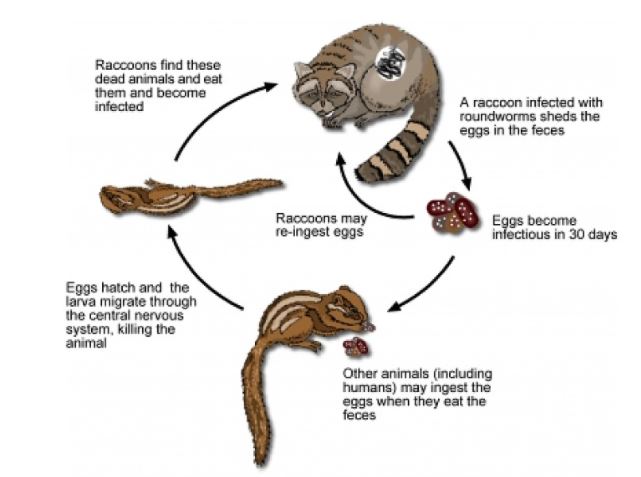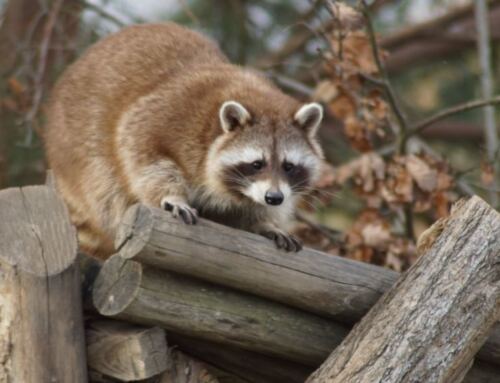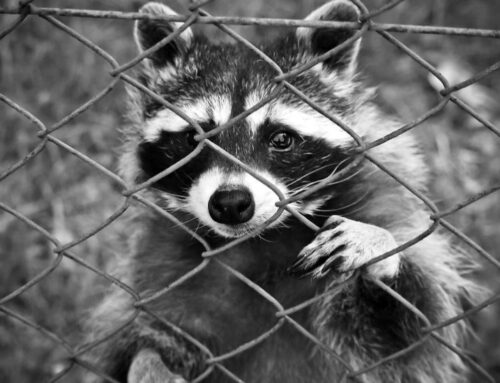When raccoons invade your space and get comfortable around your home there is more to worry about than just the mess they’ll make of your yard and garbage. Raccoons often carry parasites that can lead to some pretty serious issues for any animal or person that becomes infected as a result, namely roundworms or Baylisascaris procyonis
What are roundworms?
If you’ve raccoons in your home, get them out fast and block the entry points. At Regional Wildlife Services, this is a common service we perform for our Burlington, Oakville and Halton area community. Let us help you!
Raccoon roundworms grow in a raccoons’ intestines. Starting as an egg, millions can be shed into the environment through their feces. While not immediately a problem these eggs can become infectious after 2 to 4 weeks and can actually survive in soil for many years.
How does the infection spread?
Because raccoons are an animal that will create a communal latrine and have a habit of always going to the same spot to defecate, there can be a significant amount of contaminated feces in an area. If a human or pet were to accidently swallow any eggs that can be found in nearby food, water or soil, they can become infected quite easily.
Consider a child who has a habit of putting their hands in their mouth often, a backyard garden that may get visited by raccoons or a pet that spends time outside sniffing the path of the backyard raccoon as possible sources of infection.
Once hatched, these roundworms become larvae and will travel throughout the body to the eyes, liver, spinal cord, brain or other organs, carrying the infection with them and basically eating healthy tissue on their way.
The effects of a roundworm infection
Though a roundworm infection is rarely fatal in humans, it can lead to unpleasant and serious side effects with a root cause that can be difficult to diagnose. Since there is no actual test to determine whether you are facing a roundworm infection, the only way to diagnose it is through eliminating other possibilities, which can make for a long process.
If infected by raccoon roundworms you may experience any of these symptoms, usually about a week after the initial exposure:
- General fatigue
- Nausea
- A loss of muscle control and coordination
- An inability to focus
- An enlarged liver
- In extreme cases you may experience blindness or even a coma
Prevention is the best way to go
Because a raccoon roundworm infection is so difficult to control and diagnose, the best way to ensure that you and your family are safe is to prevent raccoons from having the opportunity to create an infectious zone. There are a number of steps you can take to ensure the highest level of safety for your home.
Inspect your area for dens and latrines, removing them immediately – Dens are most likely to be found under your shed, deck or porch or in dark, wooded areas on your property. If unsure, a pest removal company can help you spot and identify potential concerns.
Keep kids away from where raccoons have been spotted and wash hands immediately after returning inside – Especially for kids who may have been playing in dirt or other suspect areas, washing potential contaminants off immediately is essential.
Use boiling water to treat any suspect areas – No other pesticide or treatment is effective in the destruction of roundworm eggs.
Don’t leave pet food or other food sources outside – Raccoons are opportunistic pests and will gladly create a den where they find a regular source of food. And raccoons aren’t picky about what that food source is!
Cover garbage cans, sandboxes, ponds and any other standing water or food source
Clean your yard of any brush or dark wooded areas – Raccoons are likely to try to create a den in any dark, hidden space.
Raccoon roundworms are not something to chance
Though raccoons are annoying for a wide variety of reasons, their potential for spreading a roundworm infection is reason enough to not allow them to get comfortable in your yard. Since a roundworm infection can be hard to pin point, it is essential that you take steps to prevent the possibility for your family. Luckily, raccoon prevention can be quite easy but if you’re ever in doubt, call a professional pest removal company to consult or give you a hand.






